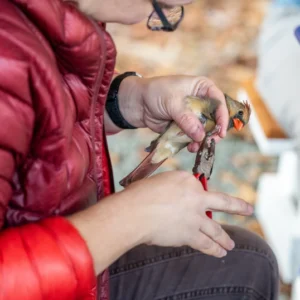Déjà vu all over again: Species at Risk and the Trans Mountain Pipeline review process

VICTORIA, CANADA – July 22, 2019
While it’s usually considered bad form to be overly celebratory about the filing of a lawsuit, from time to time environmental defenders do need a healthy sense of humour.
A case in point arose last week, when BC Nature was forced once again to challenge the adequacy of the National Energy Board’s (“NEB”) review of the impacts of the Trans Mountain Expansion Project (“TMX”) on species at risk. To this end, its lawyers at the Pacific Centre for Environmental Law and Litigation Law Corporation (CELL), filed motion materials at the Federal Court of Appeal, asking it to overturn federal Cabinet’s recent re-approval of the TMX project.
The materials themselves filled six Bankers Boxes (see photo). They document in painstaking detail what BC Nature has been saying all along throughout this flawed review process: namely, that as regulator, the NEB has a solemn legal duty to all species listed under the Species at Risk Act (“SARA”). Among other things, this duty requires it to properly and fully consider how projects may impact such species and what can be done to mitigate project-related impacts; a duty, we say, it completely failed to discharge in relation to the listed marine bird species that are likely to be severely impacted by a marine oil spill.
The TMX process is not the first time BC Nature has been thrust into the role of making these arguments. This week’s filings are strikingly similar to what BC Nature’s lawyers told the joint review panel in the Northern Gateway hearings back in 2012.
BC Nature first became involved in the TMX review process in 2014, as a joint intervenor with Nature Canada in the NEB’s original hearing process. Cabinet initially approved the TMX project in 2016, but the Federal Court of Appeal set aside that approval in 2018 in its landmark Tsleil-Waututh decision. The Court held that the NEB had failed in its duty to consider the project’s impacts under federal environmental assessment law, and to protect SARA-listed species.
As a result, the NEB was required to reconsider the project’s impacts on marine species. BC Nature and Nature Canada participated in the reconsideration hearing to ensure the project’s impacts on vulnerable bird populations were properly assessed. The NEB’s reconsideration report was sent to Cabinet in February 2019.
For SARA-listed species, the persistent failure of federal regulators to grasp the basic fundamentals of their environmental assessment responsibilities brings to mind Stephen Hawking’s wry observation that “life would be tragic if it weren’t funny”.
In the words of Chris Tollefson, CELL’s executive director and longtime legal counsel to BC Nature and Nature Canada,
“The Federal Court of Appeal was crystal clear about what the NEB needed to do to satisfy its obligations under SARA to protect marine birds and other listed species adversely affected by this project. It is unfortunate we have to go back to court to ensure these species get the benefit of the law as it was written and intended.”
Perhaps one day, like Bill Murray’s character in Groundhog Day, we’ll find to our amazement that the seemingly endless loop of regulatory indifference to species at risk has been broken. Until then, we will all need a well-honed sense of humour (and history).
BC Nature is a Nature Network partner and please visit their home page to learn more about how to support their Lawsuit and other efforts.



